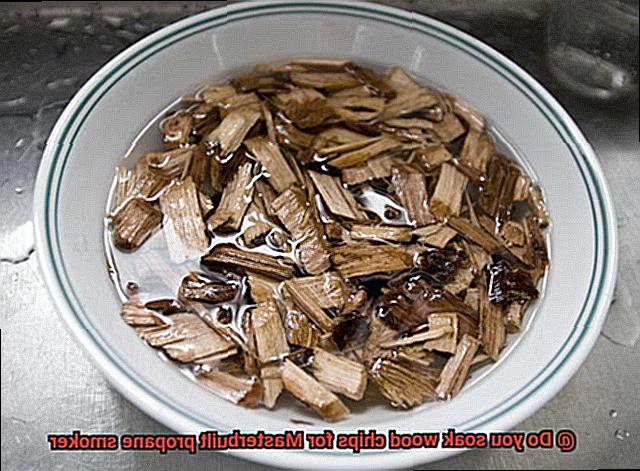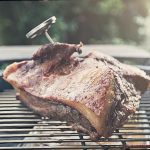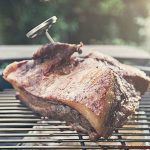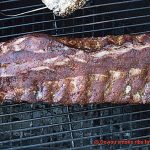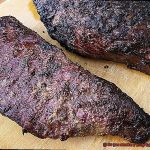Hey there, fellow grill masters. Are you stuck in a debate over whether to soak your wood chips before using them in your Masterbuilt propane smoker? It’s an age-old question that has sparked endless discussions among BBQ enthusiasts.
On one hand, soaking can extend the burn time of your wood chips, leading to a slow and steady release of smoke that evenly flavors your meat. But on the other hand, some argue that it can cause too much steam production, leading to temperature fluctuations and an unsatisfactory outcome.
But don’t worry, my friend. In this post, we’ll dive deep into the topic of soaking wood chips for your Masterbuilt propane smoker. We’ll examine the pros and cons of soaking and discover which types of wood benefit from a good soak and which do not.
By the end of this read, you’ll have all the knowledge you need to make an informed decision about whether or not to soak your wood chips for your next BBQ session. So grab yourself a cold beverage, sit back, and let’s get smokin’.
Contents
What is a Masterbuilt Propane Smoker?
If you’re a foodie who craves that smoky flavor in your meat, poultry, fish, and vegetables, then the Masterbuilt Propane Smoker might be right up your alley. This smoker is designed to use propane gas as its fuel source and is perfect for those who don’t have the time or patience to use traditional wood-fired smokers.
The Masterbuilt Propane Smoker boasts a cabinet-style design with several racks to hold your food while it cooks to perfection. Additionally, it’s equipped with a temperature control mechanism that allows you to adjust the heat according to your needs. Compared to other types of smokers, this one is easy to use and maintain.
As with any smoking method, there are always debates about the best ways to achieve the desired flavors. One of the most discussed topics when it comes to using a Masterbuilt Propane Smoker is whether or not to soak wood chips before using them. Some experts argue that soaking is unnecessary because the propane smoker already produces enough moisture to keep the chips from burning up too quickly. However, others believe that soaking the chips can enhance the flavor of your meat.
So, should you soak or not? Ultimately, it comes down to personal preference and experimentation. If you do decide to soak your wood chips, it’s recommended to soak them for at least 30 minutes before using them in the smoker. This will give them enough time to absorb water without becoming too saturated.
One of the advantages of using a Masterbuilt Propane Smoker is that it’s a convenient and efficient way to smoke food. It’s an excellent option for those who want that delicious smoky flavor without having to spend hours tending to a fire. Plus, propane gas is readily available, making it easy to find fuel for your cooking needs.
The Benefits of Soaking Wood Chips
Look no further than soaking your wood chips to take your smoking game to the next level. As a seasoned expert on the benefits of soaking wood chips for a Masterbuilt propane smoker, let me break down why this technique can make all the difference in your BBQ.
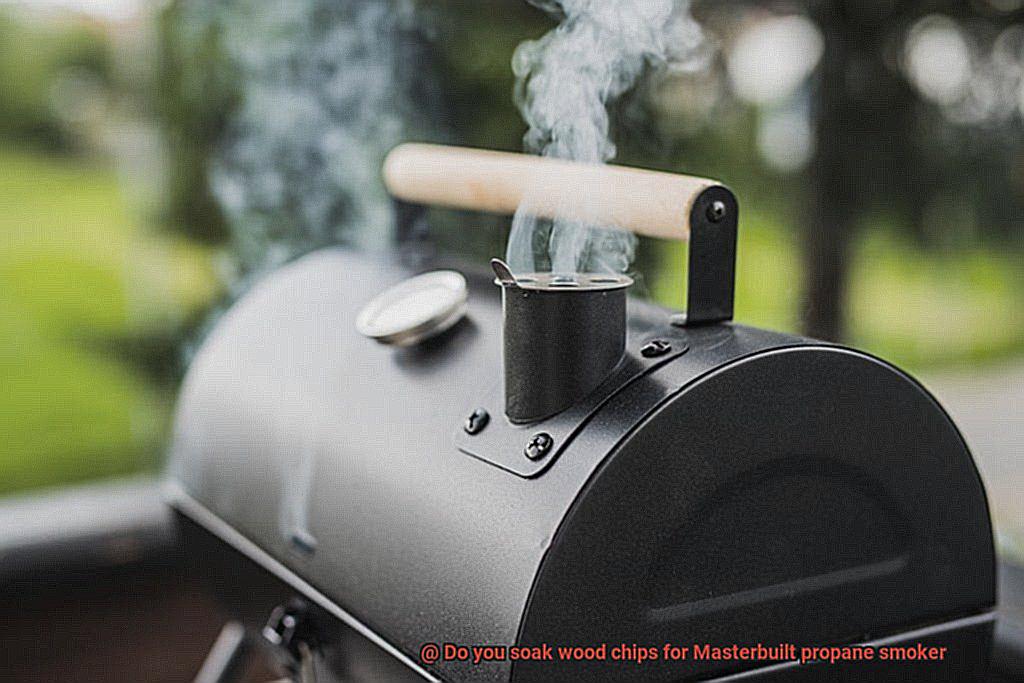
- Let’s start with the basics – soaking your wood chips can prevent them from burning too quickly. This is key because if your chips burn too fast, they’ll release too much smoke and overpower the flavor of your meat. But by soaking them, you can prolong their smoking time and get a more even and controlled smoke. The result? A perfectly smoked piece of meat that will have everyone begging for your secret recipe.
- But it’s not just about preventing burning – soaking your wood chips also helps to keep the temperature low and steady. This is crucial for smoking meat because it allows it to cook evenly and absorb more of that delicious smoky flavor. By slowing down the burning process, you can ensure that your meat is cooked to perfection every time.
- And let’s not forget about the most important part – the flavor. Soaking your wood chips can create a more flavorful smoke by adding moisture to the equation. When the chips are soaked, they absorb water which turns into steam when heated. This steam mixes with the smoke and creates a more flavorful and moist smoke that penetrates the meat. The result? A mouthwatering, smoky flavor that will have everyone coming back for seconds (and thirds).
But before you go soaking all of your wood chips, it’s important to note that not all woods require soaking. Harder woods like hickory and mesquite will need a longer soak time than softer woods like apple or cherry. And it’s always a good idea to experiment with different soaking times to find what works best for your smoker and meat.
The Drawbacks of Soaking Wood Chips
However, the debate over whether or not to soak wood chips before using them in your Masterbuilt propane smoker has been ongoing. While some people believe that soaking wood chips can prevent them from burning up too quickly and producing too much smoke, there are significant drawbacks to consider.
Firstly, soaking wood chips can significantly prolong the smoking process. Wet wood chips take longer to heat up and start producing smoke, meaning it will take longer for your meat to cook. This can be frustrating, especially if you’re looking for a quick and easy smoking process.
In addition to lengthening the cooking time, soaking wood chips can also produce inconsistent smoke production. The release of water vapor as the chips heat up can dilute the smoke and make it less flavorful. This leads to a less intense smoky flavor in your meat, which is unacceptable for any smoking enthusiast.
Moreover, soaking wood chips can create a messy experience. Wet wood chips tend to stick together and clump up, making them difficult to distribute evenly in the smoker. This results in hot spots and uneven cooking, which is not ideal when smoking meat.
So what’s the solution? If you’re looking for a quick, consistent smoking experience with intense flavor, it’s best to skip the soaking step altogether. Opting for dry wood chips that will produce a consistent amount of smoke without prolonging the cooking process or causing a mess is the way to go.
To recap, while soaking wood chips may seem like a good idea in theory, there are several drawbacks to consider. As an expert in all things smoking, I highly recommend skipping the soaking step for a better overall smoking experience. A summary of reasons why you should avoid soaking wood chips includes:
- Prolongs the smoking process
- Inconsistent smoke production
- Creates a messy experience
Different Types of Wood Chips to Use in a Masterbuilt Propane Smoker
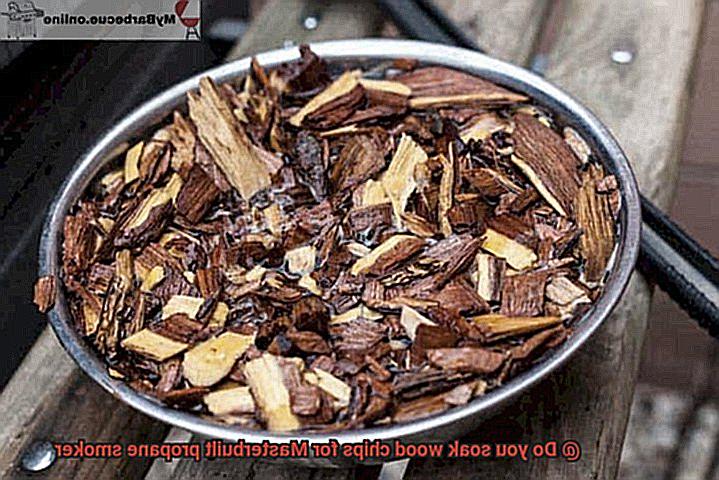
If you’re a fan of smoking meat, you know that choosing the right type of wood chips is essential to achieve the perfect flavor. With so many options available for use in a Masterbuilt propane smoker, it can be overwhelming to decide which one to use. Here are some popular options and how they can enhance the taste of your food:
Hickory
This classic option is known for its strong, smoky flavor that pairs well with beef, pork, and poultry. It’s a popular choice for those who love bold, robust flavors in their meat.
Mesquite
If you’re looking for a bold, earthy flavor to add to your beef and game meats, mesquite is a great choice. However, it’s important to use it sparingly as it can easily overpower your food.
Apple
For a sweeter, fruitier flavor, applewood is an excellent option. It has a subtle fruity taste that works well with pork and poultry, and it can also add flavor to vegetables.
Cherry
Another fruitwood option, cherrywood has a mild, sweet flavor that pairs well with pork and chicken. It’s an excellent way to add a unique twist to your dishes.
Oak
Oak is one of the most versatile woods for smoking all types of meats. It has a mild flavor that won’t overpower your food but will still infuse it with a rich smoky taste.
Maple
Maple wood has a subtle sweetness that works well with pork and poultry. It’s also perfect for smoking cheese and vegetables, adding a complex but not overpowering flavor.
How to Soak Wood Chips for a Masterbuilt Propane Smoker
The question of whether or not to soak wood chips before using them in the smoker has caused quite a bit of debate. Here are some pros and cons of soaking wood chips for a Masterbuilt propane smoker.
Enhanced Flavor:
Soaking wood chips can help to enhance the flavor of your meat by producing a more even and consistent smoke. The water in the soaked wood chips will prevent them from burning too quickly and producing too much smoke at once.
This will give your meat a nice smoky flavor without overpowering it. It also ensures that the smoke is released slowly throughout the cooking process, so the meat has time to absorb it fully.
Longer Cooking Time:
Soaking wood chips can also prolong the cooking time by reducing the temperature inside the smoker. The water in the soaked wood chips will produce steam, which can affect the temperature and make it harder to maintain a consistent heat level. This can result in longer cooking times and make it more difficult to achieve a perfectly cooked piece of meat.
Personal Preference:
Ultimately, whether or not to soak your wood chips comes down to personal preference. Some people swear by soaking their wood chips, while others prefer to use them dry. It’s important to experiment with both methods and find what works best for you and your taste buds.
Type of Wood:
When it comes to choosing the type of wood to use for smoking, it’s important to consider the flavor profile you’re looking for. Popular options include hickory, mesquite, apple, and cherry wood. Each type of wood imparts a unique flavor that can complement different types of meats.
Manufacturer Recommendations:
It’s important to follow the manufacturer’s instructions and recommendations when using a Masterbuilt propane smoker. Some smokers may not require soaking of wood chips at all, while others may recommend soaking for a specific amount of time. Following these guidelines will ensure that you get the best results from your smoker and avoid any potential damage.
Tips for Using Soaked Wood Chips in a Masterbuilt Propane Smoker
Using soaked wood chips in a Masterbuilt propane smoker is a great way to add that delicious smoky flavor to your meats. However, there are a few tips and tricks to keep in mind to ensure the best results. Here are five sub-sections to consider:
Soaking time and amount of water
When soaking wood chips, it’s important to use enough water to fully submerge them. This ensures even soaking and consistent smoke production. Most grillers soak their wood chips for at least 30 minutes before use, but some prefer to soak them overnight for a more intense smoky flavor.
Preheating your smoker
Soaked wood chips produce more steam and smoke, which can cause the temperature inside the smoker to drop. To avoid this, it’s recommended to preheat your smoker before adding the soaked wood chips. This will help maintain a consistent cooking temperature.
Using a foil packet
To prevent the wood chips from catching fire and burning too quickly, wrap them in aluminum foil and poke a few holes in the packet for ventilation. Place it on top of the burner deflector to allow for even heat distribution.
Type of wood
Different types of wood produce different flavors, so it’s important to choose the right kind of wood chips based on what kind of flavor you want to achieve. Some popular options include hickory, mesquite, apple, and cherry.
Monitoring smoke levels
Too much smoke can overpower the flavor of your food, while too little smoke may not give it enough flavor. Adjust the amount of soaked wood chips accordingly and keep an eye on the smoke levels inside your Masterbuilt propane smoker.
Alternatives to Soaking Wood Chips for a Masterbuilt Propane Smoker
Firstly, let’s talk about the option of using dry wood chips. This method is perfect for those who are short on time and want to get right into smoking. Simply add the dry wood chips directly to the smoker without any pre-soaking, and you’re on your way to smoky meat heaven. This technique is especially beneficial for those who like to smoke their meat quickly.
Another alternative is to use wood chunks instead of wood chips. These larger pieces of wood burn more slowly and evenly, leading to a consistent smoke flavor throughout the cooking process. Wood chunks don’t require soaking before use, which saves time and effort. Plus, if you want to add a different flavor profile, you can easily mix and match different types of wood chunks.
If you’re looking for a foolproof, easy-to-use option, consider using wood pellets instead of chips. These compressed sawdust pellets come in a variety of flavors and are specifically designed for use in pellet smokers. They provide a consistent smoke flavor and are extremely user-friendly. Using wood pellets is an excellent option for beginners or those who may not have as much experience with smoking meats.
yv0kJzmIgro” >
Conclusion
In the world of BBQ, the debate over whether to soak wood chips for a Masterbuilt propane smoker has raged on for years. Some swear by it, while others believe it’s a waste of time and effort. So, what’s the verdict?
While soaking wood chips can enhance the flavor of your meat, it also comes with its fair share of drawbacks. Temperature fluctuations and inconsistent smoke production are just two potential issues that can arise from soaking your wood chips.
If you do decide to go down the soaking route, make sure to give them at least 30 minutes in water before use. This will ensure they absorb enough water without becoming too saturated. Harder woods like hickory and mesquite will require more time than softer woods like apple or cherry.
However, there are alternatives to soaking that may be worth considering. Dry wood chips or even wood chunks or pellets can provide a cleaner, less messy smoking experience without sacrificing flavor.
When choosing your wood type, consider the flavor profile you’re after. Hickory and mesquite offer bold flavors, while apple and cherry provide a sweeter taste. Oak and maple are great all-rounders that pair well with most meats.
Remember to follow manufacturer recommendations and keep an eye on smoke levels for optimal results from your Masterbuilt propane smoker.
Ultimately, whether you choose to soak your wood chips or not is entirely up to personal preference and experimentation. Don’t be afraid to try different methods until you find what works best for you.

